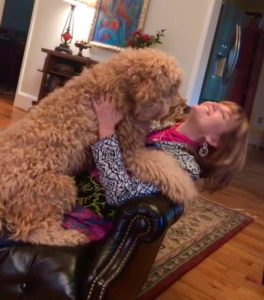I love that August celebrates National Smile day. Smiling is powerful. It releases a flurry of feel-good hormones that decrease stress and anger. And when people see our smile, they have brain neurons, called mirror neurons, which prompt them to smile back. Excellent!
Last week I saw a friend I hadn’t seen in months. As I sat down at the picnic table, I felt like we were characters in a Netflix crime show where the witnesses were promised anonymity. She appeared as a silhouette with the hot summer sun beating down on her like a blinding spotlight. Her face and voice were distorted from behind the mask. She was almost unrecognizable! And we had a hard time getting comfortable with each other.
I hear people say, “What’s the big deal? Just put on a mask!” Wearing masks IS a really big deal. I know looping the elastic around our ears is a simple (and effective) practice, but it does comes with some compromises. Wearing a mask affects the way we relate to each other. And our relationships, good relationships, are the number one reason we live well and live longer. Yes the number one reason!
If we continue to wear masks then we better get better at it:
1. Think of your facial expressions as emotional radar
From early on we’ve learned how to read people’s faces so we know what’s going on with them. We can detect pain when we see a grimace of pain or sarcasm when we see a smirk. When we see people’s faces we can sense if an apology is sincere and what an expression of love really means. So how do we preserve this all important emotional radar now that we’re wearing masks?
- Make an effort to smile with your eyes.
- Nod your head to show agreement and compassion.
- “Face” each other with your posture to show you’re paying attention and that you, care.
2. Now’s a good time to ask, “Can you hear me now?”
When we can’t hear we stumble through conversations. Soft voices, noisy environments, unfamiliar dialects and lazy speech distort what we hear. So we become frustrated and guess what’s being said, or tune out and disconnect altogether. We feel isolated! Instead:
- Speak up.
- Speak slowly.
- Speak clearly.
3. Say it with your eyes
Eye contact is at an all-time low. Conflict and discomfort, and there’s a lot these days, tempts us to look away and down. Some of our most important conversations are happening via a text – without eye contact. Even in video chats, most people look at their own reflection. Communication is struggling to be effective and satisfying.
- Look up.
- Look at each other.
- Say it with your eyes.
4. Offset the bad “juju” of the mask
We know that wearing a mask today is helpful, but our brain chemistry signals danger because masks have long been associated with threats and vulnerability: stress rises and the body is flooded with “warning” neural transmitters. And once again we look down and talk too fast or too quietly. It’s more important than ever that we signal we’re a friend, not a foe.
- Find a friendly tone of voice
- Develop your signature warm wave
- Be kind whenever possible. (It’s always possible)
These days we need protect more than our lungs. We need to protect our relationships, the reason we’ve been created. Look into each other’s hearts and souls, past the mask that separates us.
We’re spending a lot of time worrying about the future. One thing is certain: it’s not likely to be what we imagine. Life is happening now. Every time we “face” a friend or a stranger we have the opportunity to reinforce that we are not alone and that we matter.
So smile anyway and every way you can and maybe, just maybe, we’ll come a little bit closer to healing the world.
(A special call-out to my friend, Jaxson, who reminds me to smile out loud.)

